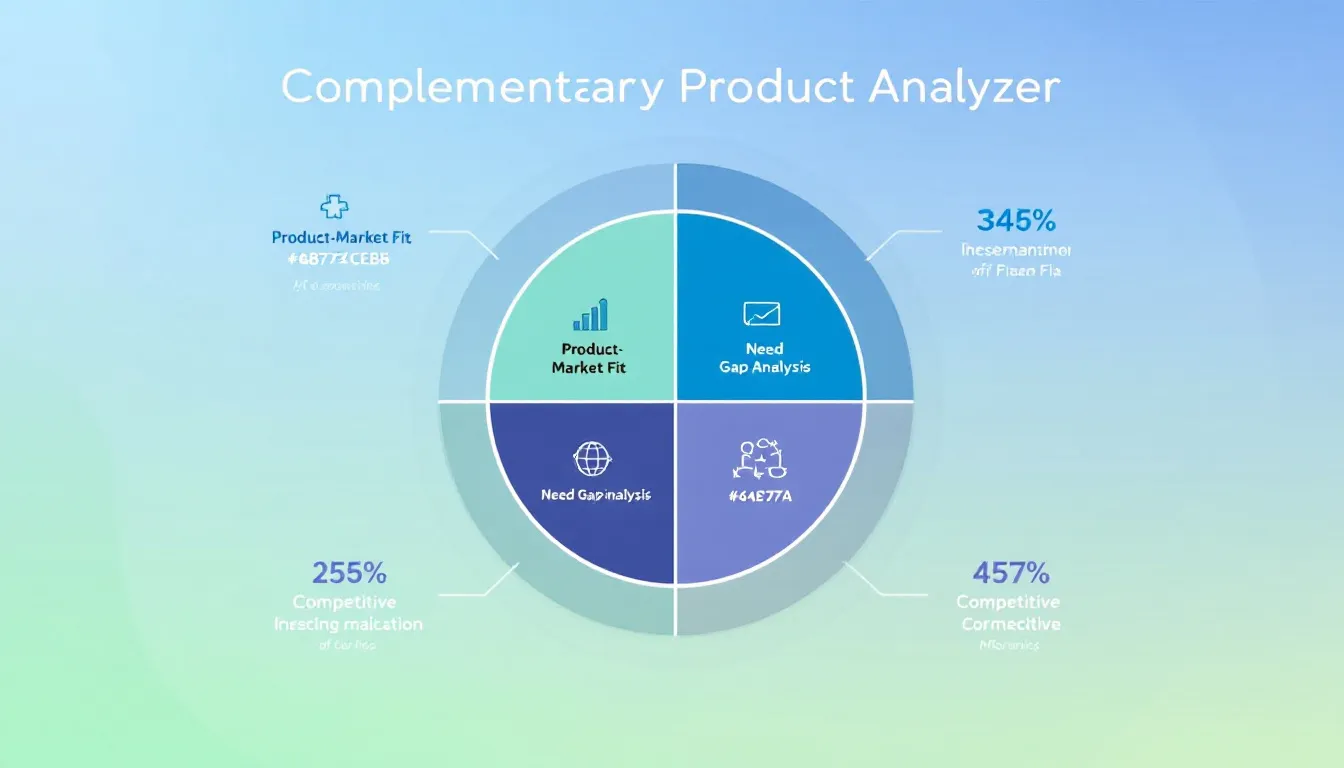Is this tool helpful?
How to Use the Complementary Product Analysis Tool Effectively
The Complementary Product Analysis Tool helps businesses identify and evaluate potential new products or services that can enhance their existing offerings. Here’s a detailed guide on using each field effectively:
Company Name Field
Enter your company’s official name. For example:
- “Green Earth Wellness Solutions”
- “TechPro Software Systems”
Current Products or Services
List your existing offerings with brief descriptions. Include key features and benefits. Example entries:
- Wellness coaching services – One-on-one virtual wellness coaching, personalized nutrition plans, stress management techniques
- Enterprise software solutions – Cloud-based project management system, team collaboration tools, resource allocation software
Target Audience Description
Detail your customer segments’ characteristics, including:
- Demographics (age, income, location)
- Psychographics (interests, values, lifestyle)
- Behavioral patterns (purchasing habits, brand preferences)
Market Trends and Customer Needs
Document current industry developments and customer requirements, such as:
- Emerging technologies
- Changing consumer preferences
- Unmet market needs
Understanding the Complementary Product Analysis Tool
This innovative tool leverages advanced analysis to identify strategic opportunities for product line expansion through complementary offerings. It evaluates market dynamics, customer needs, and existing product synergies to generate actionable recommendations for business growth.
Core Components of Analysis
- Product-market fit assessment
- Customer need gap analysis
- Competitive landscape evaluation
- Market trend alignment
Benefits of Using the Complementary Product Analysis Tool
Strategic Advantages
- Identify untapped market opportunities
- Enhance customer lifetime value
- Strengthen competitive positioning
- Optimize resource allocation
Operational Benefits
- Streamlined product development process
- Reduced market research costs
- Data-driven decision making
- Improved time-to-market
Problem-Solving Capabilities
Market Entry Challenges
The tool addresses common market entry challenges by:
- Identifying viable product opportunities
- Evaluating market readiness
- Assessing competitive dynamics
Product Portfolio Optimization
Enables strategic portfolio decisions through:
- Gap analysis in current offerings
- Cross-selling opportunity identification
- Bundle potential evaluation
Practical Applications and Use Cases
Case Study 1: Fitness Equipment Manufacturer
A fitness equipment manufacturer used the tool to identify complementary digital products:
- Initial offering: Premium treadmills and exercise bikes
- Tool recommendation: Mobile fitness tracking app with equipment integration
- Result: 40% increase in customer engagement and 25% boost in equipment sales
Case Study 2: Professional Services Firm
A consulting firm expanded its service portfolio based on tool insights:
- Core service: Management consulting
- Tool recommendation: Digital transformation advisory services
- Outcome: 35% revenue growth within 12 months
Implementation Strategy
Step-by-Step Process
- Data collection and input
- Analysis review and validation
- Recommendation prioritization
- Implementation planning
- Performance monitoring
Success Metrics
- Revenue growth from new offerings
- Customer adoption rates
- Cross-selling success
- Market share expansion
Frequently Asked Questions
What types of businesses can benefit from this tool?
The tool is valuable for businesses across industries, including:
- Retail and e-commerce
- Professional services
- Technology companies
- Manufacturing firms
- Healthcare providers
How often should I conduct a complementary product analysis?
Regular analysis is recommended:
- Quarterly for fast-moving markets
- Semi-annually for stable industries
- When significant market changes occur
What information should I prepare before using the tool?
Gather the following data:
- Current product performance metrics
- Customer feedback and surveys
- Market research reports
- Competitor analysis
How can I maximize the value of tool recommendations?
To optimize results:
- Provide detailed, accurate input data
- Review recommendations with stakeholders
- Develop comprehensive implementation plans
- Monitor and adjust strategies based on performance
What makes an ideal complementary product?
Key characteristics include:
- Strong synergy with existing offerings
- Clear customer value proposition
- Manageable development/acquisition costs
- Market timing alignment
How do I prioritize multiple recommendations?
Consider these factors:
- Resource requirements
- Expected return on investment
- Time to market
- Strategic fit
- Risk assessment
Important Disclaimer
The calculations, results, and content provided by our tools are not guaranteed to be accurate, complete, or reliable. Users are responsible for verifying and interpreting the results. Our content and tools may contain errors, biases, or inconsistencies. We reserve the right to save inputs and outputs from our tools for the purposes of error debugging, bias identification, and performance improvement. External companies providing AI models used in our tools may also save and process data in accordance with their own policies. By using our tools, you consent to this data collection and processing. We reserve the right to limit the usage of our tools based on current usability factors. By using our tools, you acknowledge that you have read, understood, and agreed to this disclaimer. You accept the inherent risks and limitations associated with the use of our tools and services.







